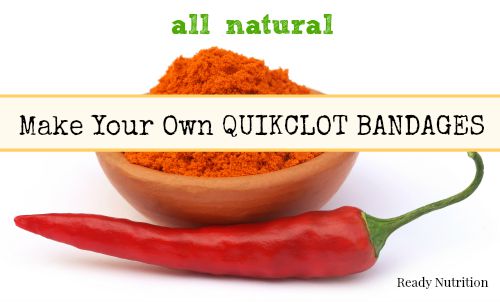
Stopping a critical life threatening bleed is paramount
A downside to this type of emergency wound dressing is it is extremely difficult to debride or clean out of a wound. As well, because you are introducing a foreign object into the body, it has the capacity of cause further irritation and possible infection. In fact, many complain that when they used QuikClot, it caused heat in the wound from the chemicals used. This can cause a lot of pain! Moreover, many turn to QuikClot wound dressings prematurely when applying direct pressure may have been the best approach.
Remember: If you have not severed an artery, apply direct pressure to the wound and see if your body creates a natural clot.
Cayenne: A Natural Wound Dressing
If you find yourself in a situation where you have to attend to a bleeding wound, take comfort in the fact that everything you need is sitting in your kitchen pantry. Many have found that cayenne pepper is an effective alternative and natural version of QuikClot. Cayenne pepper contains an active ingredient, called capsaicin, which has analgesic (pain relieving) properties and various other medicinal uses.
Why is cayenne pepper so effective for bleeding wounds?
- Equalizes the blood pressure and allows cuts—even deep cuts—to clot quickly.
- Possesses antifungal and antibacterial capabilities, it naturally disinfects the wound
- Naturally promotes healing in tissues
- Is a natural pain killer
Cayenne pepper is a great survival plant and also works to improve blood circulation, assist digestion, stimulate perspiration and saliva, and lessen pain from swollen or arthritic joints and limbs.
Cayenne powder can be applied directly to the open wound to stop bleeding. Simply sprinkle a generous amount of pepper to the wound and cover with a gauze pad to apply direct pressure to wound. Apply pressure for up to 10 minutes or make your own cayenne pepper gauze pads.
To Use Cayenne Pepper Gauze
- Remove debris and flush wound thoroughly.
- Place cayenne-coated gauze on wound and add additional gauze pads to apply pressure.
- Apply direct pressure for up to 10 minutes.
- Remove gauze pad and wrap with clean bandage.
- If bleeding does not stop, the wound may need stitches.
Additionally, you can make your own bandages using chitosan
Nature always seem to provide us with everything we need to get by. Chances are, many of you have some cayenne pepper laying around, so keep it safe. You never know, you may need it during an emergency.

Wow! Interesting! My significant other was recently diagnosed with a mild form of hemophilia (basicly he just clots slower, so the risk is serious in surgery or major trauma but not for minor cuts etc.) so I’ve been looking into ways to prep for his now more complicated medical needs. The real QuickClot won’t be of much use to him because it relies on the bodies natural clotting mechanisms, but the product Wound Seal is fomulated to work for hemophiliacs. I wonder if this would be effective for him. Very cool. I’ll buy a few extra shakers of cayanne for the first aid kits, at least for use on others if not him.
Check out Sangre’ de Drago. You will want a bottle or two in your first aid kit. It is amazing how fast it stops bleeding.
Also tumeric, black pepper and slippery elm. I carry a small container of cayenne with me at all times. I have used the cayenne and a chef I know has used tumeric in kitchen injuries. The tumeric does not burn like cayenne. I personally don’t think the cayenne burns that bad.
Check out Sangre’ de Drago. You will want a bottle or two in your first aid kit. It is amazing how fast it stops bleeding.